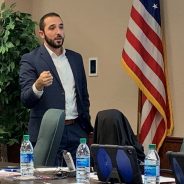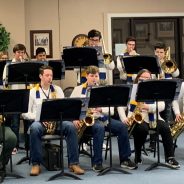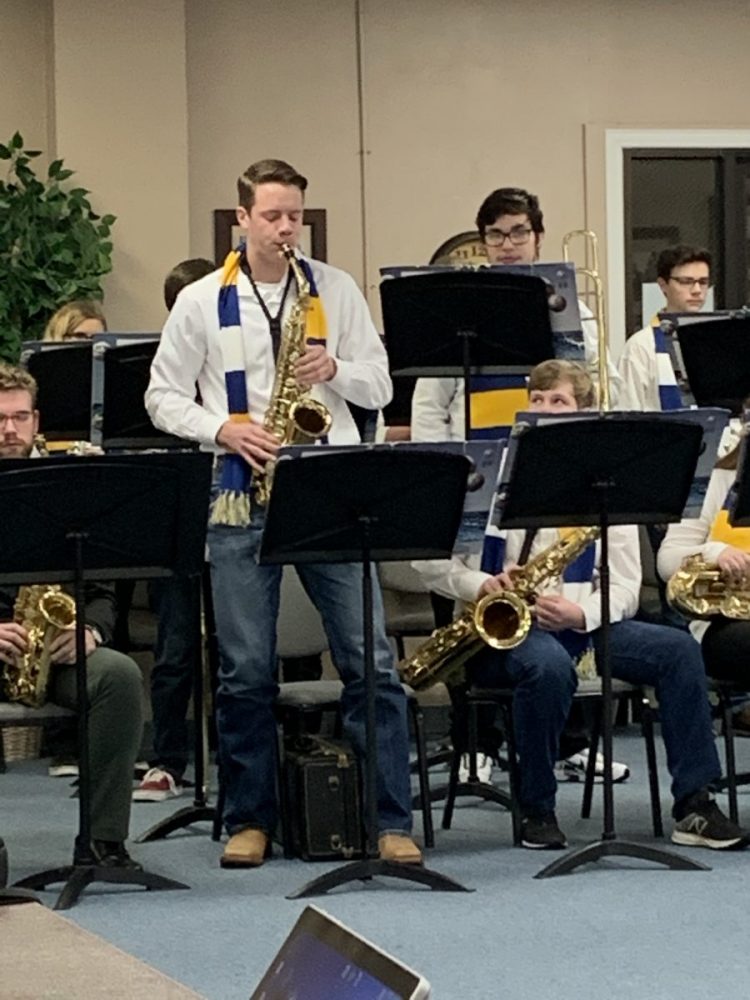FM 71 West, 2 County Roads Waterlogged By Rains
At least two county roads were reported overnight to be covered by water, the result of the rain received over the last few days. Motorists are reminded to be cautious when approaching low lying roads that are covered in water.
The FM 71 bridge is under water, as is typical in times of rain accumulation.
A motorist also at 8:07 p.m. Feb. 12 reported County Road 2415 to be flooded. The caller told officials he had to leave a truck because it as in high water on the road.
County Road 3531 was also reported to sheriff’s officials as being impassable Thursday morning.
A few vehicle crashes were reported on Wednesday, including one vehicle reportedly hydroplaning off Interstate 30 west into the ditch between the highway and service road near mile marker 114 at 5:38 a.m. and another vehicle hit the wall on the north I-30 service road near mile marker 129 at 6:43 a.m. Feb. 12, according to sheriff’s reports.
No other weather related reports were reported to county officials.

Kenny Chesney Chillaxin Ticket Giveaway: VI

KSST and KRVA are giving away tickets to the Kenny Chesney Chillaxin Concert at AT&T Stadium.
Chillaxification 2020 kicks off Saturday, April 18 at AT&T Stadium in Arlington, Texas – and culminates Friday, August 28 with his 20th show at Gillette Stadium in Foxboro, Mass. Tickets are on sale at seatgeek.com.
Rules and Information:
The passes must NOT be resold!
Unclaimed passes will be dispersed by KSST.
Employees of KSST/KRVA can’t win.
Winner’s names and picture will be posted on Facebook.

Previous Winners





Steroids, Marijuana Found After Crash In Cumby
Cumby Police arrested a 28-year-old Lauderdale Lakes, Florida man allegedly found with a bottle of steroids and marijuana following a crash Wednesday afternoon, according to arrest reports.
Cumby Police Officer Zack Steward alleged the driver of a Dodge Caravan sped up as if to lose the officer when he entered Interstate 30 east near mile marker 109 around 3:45 p.m. Feb. 12. Steward reported the van took the 110 exit onto the south I-30 service road at a high rate of speed, then turned onto the FM 275 overpass. The van allegedly continued toward Frisco Street in Cumby.

Steward alleged he saw the passenger’s side window of the van down as he attempted to catch up to the van. The van crashed out into the ditch after going over the FM 275 overpass. A probable cause search allegedly revealed a bottle of Powerhouse Labs steroids and two small baggies of marijuana, Steward alleged in arrest reports.
Suspecting the van driver threw something out of the vehicle, Chief Paul Robertson assisted by checking the south service road where the van had traveled. Robertson found a Walmart bag containing more marijuana and the driver’s wallet with his license in it, Steward alleged in arrest reports.
Consequently, Cortney Martavius Ivory was arrested for reckless driving, tampering with evidence and possession of less than 28 grams of a Penalty Group 3 controlled substance, according to arrest reports.
Ivory remained in Hopkins County jail Thursday morning. Bond was set at $5,000 on the third-degree felony tampering charge, $2,000 on the Class A misdemeanor controlled substance charge and $1,000 on the reckless driving charge, according to jail reports.
If you have an emergency, dial 9-1-1
The Hopkins County Sheriff’s Office is located at 298 Rosemont Sulphur Springs, TX 75482. You can reach them for non-emergency matters at (903) 438-4040.
Chamber Connection – February 13, 2020

Today is the day! It is with great pleasure that the 2020 Board of Directors invites you to the 94th Annual Hopkins County Chamber of Commerce Banquet on Thursday, Feb. 13, at 6 p.m. at the Hopkins County Regional Civic Center. Tickets are already going fast!
We will host a Networking Cocktail Happy Half Hour at 6 p.m. Dinner will be served at 6:30, and the awards will follow at 7 p.m.
Please take this opportunity to bring your family, friends, and employees to an evening of dinner and community awards including Large and Small Business of the Year, Educator of the Year, Caregiver Award, Agriculturist of the Year, Woman of the Year, Growth and Renewal Award, Community Pride Award, and Citizen of the Year.
Our banquet theme is “Be the Light” and focuses on positivity and community pride moving into the next decade. It promises to be one of our most beautiful and unusual banquets to date. We are excited for you and your business to join us for this extraordinary evening.
Please make your reservation TODAY by calling the Chamber of Commerce, (903) 885-6515, or by stopping by to visit at 110 Main Street in Sulphur Springs.
VR Social is hosting an Art Experience
VR Social, located at 317 Spring St. in Sulphur Springs, is hosting a VR Art Experience on Friday, Feb. 15, from 5 p.m. to 9 p.m. Cost is $2 per person. For more information call VR Social at (903) 919-3762.
Doc Collins to host concert
Doc Collins, candidate for District 2 State Representative, is hosting a concert on Friday, Feb. 14, at the Hopkins County Civic Center at 7:30 p.m. This is a family friendly event with an entertaining production of “This Cowboy Ain’t Dead Yet” by RJ Vandygriff. This event is free of charge to attend.
First Baptist Church is hosting a 5th Grade Bash
First Baptist Church is hosting a 5th Grade Bash on Saturday, February 15, from 6 p.m. to 8 p.m. at the ROC in Sulphur Springs. This event will have free pizza, games, and tons of door prizes. It is open to all 5th grade students in our community. For additional information, call FBC at 903-885-0646.
Cornerstone Insurance to host ribbon cutting
Cornerstone Insurance will host a ribbon cutting celebration on Friday, Feb. 21, at noon. They are located at 2104 Monroe St. in Commerce. Please make plans to attend to learn about the services Cornerstone has to offer.

Candidates Have Until March 3 To File For A Place On Cumby City Council Ballot
The deadline for Cumby resident to file candidacy for a place on the May 2 Cumby City Council ballot has been extended to March 3.

Because the election is a special called election for two unexpired seats on the council, the election fall under different guidelines, city staff explained last week.
The council this week amended the prior filing order, extending the filing deadline as required to March 3, according to the notice posted by Alderman Julie Morris on the City of Cumby Facebook page
Alderman Place 1 became open when Doug Simmerman was elected mayor in November. The Place 2 seat opened with the resignation of Kristin Thompson last fall. The council on Sept. 21 appointed Audri Mayo to the Place 2 council vacancy. The council had planned to rescind that appointment at the October meeting, but Mayo resigned first. A special election was called for place 2 at the October council meeting.
The terms will be the remainder of the two-year term for Place 1 and Place 2, which ends in November.
As of last reporting, only two candidates had filed candidacy for the election: Audri Mayo for Alderman Place 2 on the council. Sheryl Lackey for Alderman Place 1 on the council.
Candidate applications are available from 8 a.m. to 5 p.m. weekdays, Jan. 15-Feb. 14 at the City of Cumby offices at 100 East Main St. Applications may also be downloaded from the Secretary of State’s website, completed, notarized and mailed to the Cumby City Hall, according to city staff.

SSISD Police Chief Presents Annual Racial Profiling Information; Reports Dash And Body Cams Needed
Sulphur Springs Independent School District Police Department this year was not only required to complete a racial profiling report for any traffic stops made, but also to modify their citations to meet additional legal requirements. The district may soon have to purchase dash cameras and potentially body cameras for Sulphur Springs ISD police officers.
Racial Profiling Report
In past years, Sulphur Springs ISD Police Department has been exempt because the school district doesn’t in the ordinary course of business routinely make traffic stops. Officers are stationed at their assigned schools most of the time.
“At this point in time, the way the law has changed, we are now required to do a full racial profiling report, whether we write one citation or we write a hundred citations,” Sulphur Springs ISD Police Chief Glynda Chester said when presenting the annual report to SSISD Board of Trustees at their regular February meeting.

The campus police department also had to modify their citations to include a means for people to file a complaint if a person, in the event a stopped motorist believes they’ve been racially profiled. A website where the complaint can be made had to be included on the ticket, Chester explained.
Overall, SSISD police wrote 10 citations, six to females and four to males. Four of the drivers were Black, four Hispanic or Latino and two White. The 10 individuals’ races were not known prior to the stops, however, the report states.
Two of the traffic stops for were for violations of the law, which would be no driver’s license or insurance, and eight were for moving traffic violations, things like speeding. All 10 traffic stops were made on city streets.
“That would be like our stops for speeding, or citizens running the red lights on a school bus when the bus was loading or unloading,” Chester said.
No searches were conducted, no contraband located, no physical force was used and no arrests resulted from the traffic stops by Sulphur Springs ISD police, Chester reported.
Four of the individuals stopped were issued written warnings and six were issued citations.
Trustee Jason Dietze asked about the jurisdiction within which school police may make traffic stops.
Chester noted SSISD police may make traffic stops may be made anywhere in the city or county within the school district. She said the city police chief said he’d like for SSISD police to take care of some of the school zones. Chester said doing so all the time would pull officers away from their designated campuses, which are officers’ main priority.
The police chief said SSISD police are mainly needed before and after school, when buses are loading and unloading. Officers often follow buses, watching to be sure motorist are abiding the law, stopping when the bus lights come on signaling them to stop for students getting on and off the bus. Often, just having officers present during those times serves as a deterrent for motorists to slow down and pay attention for the safety of students.
“Of course compliance is what we want so children are not hurt,” Chester concluded.
Future Needs
When talking with the city prosecutor for the citations, Jim McLeroy said he wants dash and body cam footage from stops forwarded to the city for prosecution of most school police traffic stops.
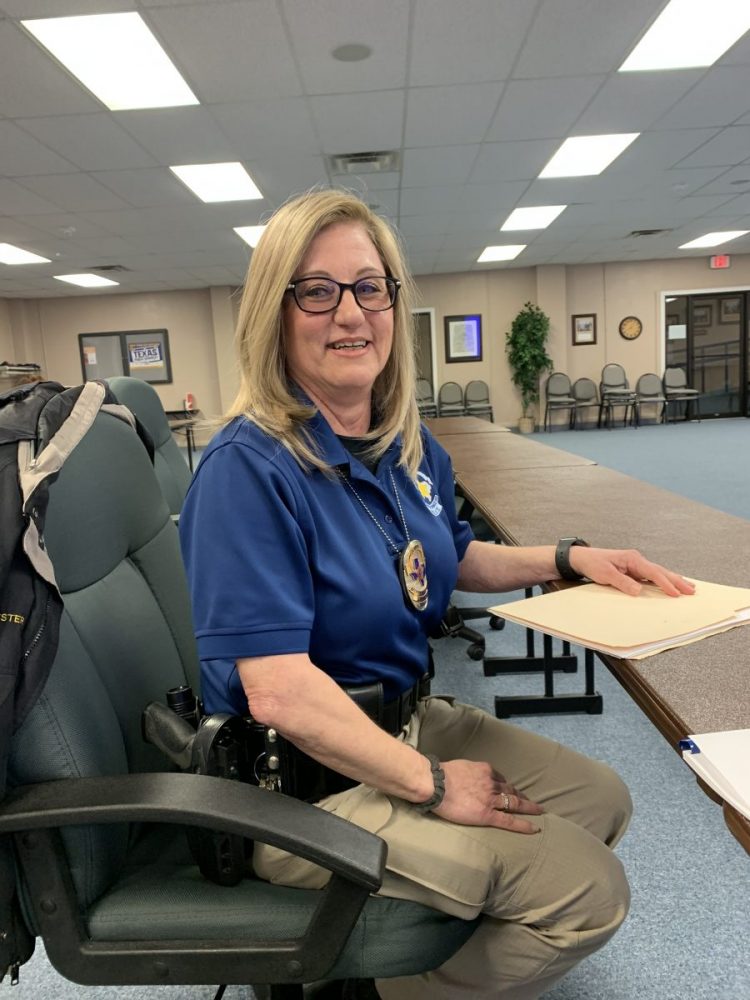
“Before he will prosecutor most of our stops, citations like stopping citizens from passing school buses with their lights on, he is requiring us to have dash cams. He wants dash cams. We might be able to get away with body cams for a while, but he really wants both and we don’t have any of those,” Chester said.
“I really hate it that we’ve got people passing school buses and we’ve got the chance of one of our students, our kids, getting hurt. Until we’re able to get those body cams and dash cams, it’s going to be hard for him to prosecute those citations,” she said.
However, with more people asking to see the videos of the alleged offenses, the dash and body camera video has become a necessary part of the process.
“Is that a state requirement or just something he wants personally?” Trustee John Prickette asked.
“It’s not a state requirement. It’s something he personally requires because he can prosecute the case if he’s got a video, he can show, ‘Yes, you ran those lights. Yes, went past that bus and you didn’t stop,” Chester replied.
When asked if the dash cam requirement would be for all school buses or officers’ vehicles, Glynda clarified the dash cam requirement for the city would be for officers’ vehicles only.

Chester noted the dash cameras automatically turn on when the officer flips on the lights on the police car. The cameras are designed in a such as way that they can go back about 3 minute, Chester expalined.
“It shows the full stop. It shows them passing the school bus. When you’re out visiting with that citizen you not only have your dash cam in your car but you also have you body cam on, which protects us and the citizens. It makes us do our jobs better and we catch anything the citizens might [dispute] in court,” Chester said.
When school board President Robbin Vaughn asked the average cost for dash cameras, Chester admitted she hasn’t yet had an opportunity to check into that. However, based on her prior knowledge, they “aren’t cheap.” She said had just talked with McLeroy earlier in the day and didn’t have time to prepare to look into that before the meeting. However, she wanted to make the board aware of the prosecutor’s requirement as soon as possible. She said she could get some quotes for the school board to present at a future meeting.
She was asked to get some figures so that district could try to work the cost into next year’s budget.
Tip About Wanted Man At Truck Stop Results In Warrant, Controlled Substance Arrest
A tip to sheriff’s deputies about a wanted person being spotted at a Hillcrest Drive truck stop resulted not only in a warrant arrest, but in a controlled substance charge as well.
At least three others were arrested on marijuana and controlled substance related charges on Monday as well.
A sheriff’s deputy just before 3 p.m. Monday, Feb. 10, reported seeing Robert Harold George’s Chevrolet 1500 in a parking spot at Love’s. The truck’s registration, the sheriff’s officers noted, had expired in July of 2019, Hopkins County Sheriff’s Sgt. Tanner Steward and Deputy Dan Turrentine alleged in arrest reports.

The deputy had communications operators confirm the registration to be expired and the Hunt County warrant to be active. While that was going on, the truck left the parking lot. A traffic stop was initiated. Deputies alleged the 50-year-old Sulphur Springs man could be seen reaching around near the center console and dash of the truck while bringing it to a stop near County Road 1100.
The driver, George, was reportedly asked to step out of the truck and was placed into custody on the Hunt County warrant for failure to appear on a driving while intoxicated with open container charge.
When asked if there was anything illegal in it, he allegedly claimed there “shouldn’t be.” An on-call wrecker was called to impound the truck. The deputy alleged finding two open alcoholic beverage containers in the truck. A clear baggy with a crystal-like substance that later field-tested positive for methamphetamine was also allegedly found behind the insert that was partially out of the open ash tray in the truck. The suspected methamphetamine and packaging weighed 0.94 grams, resulting in George also being charged with possession of less than 1 gram of a Penalty Group 1 controlled substance, Steward and Turrentine alleged in arrest reports.
George remained in Hopkins County jail Wednesday, Feb. 12, in lieu of $5,000 bond each on the controlled substance charge and Hunt County charge, according to jail reports.
At least three others were arrested on marijuana and controlled substance related charges on Monday as well.
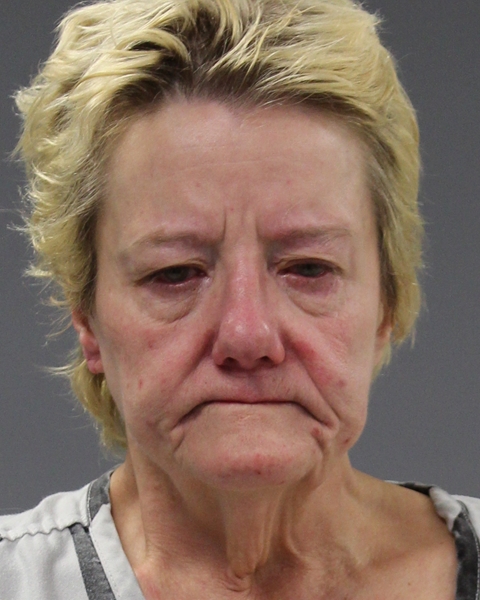
Sgt. Tanner Steward reported seeing 64-year-old Rosemary Boone Springer, a wanted woman, in the yard of her County Road 2307 residence around 12:30 p.m. Feb. 10. Steward contacted Springer and took her into custody for surety off bond on a possession of less than 1 gram of a Penalty Group 1 controlled substance, according to arrest reports. Springer spent the night in jail and was released on Feb. 11 on a $5,000 bond, according to jail reports.

Erin Virginia Blalock was arrested in Harris County and transported at 3:30 p.m. Feb. 10 to Hopkins County jail by HCSO Deputy Elijah Fite. Blalock was booked for bond forfeiture on possession of less than 28 grams of a Penalty Group 3 controlled substance and driving while intoxicated charges, according to arrest reports. She remained in Hopkins County jail Wednesday, Feb. 12 on the charge, according to jail reports.
A marijuana investigation lead Sulphur Springs Special Crimes Unit investigators to a Helm Lane apartment, where a marijuana odor was smelled when the door was opened. The 58-year-old resident allegedly admitted to marijuana use and took officers to a dresser that also contained a pipe of the kind commonly used for smoking methamphetamine, according to arrest reports. The man was arrested at 10:33 a.m. Feb. 10 for possession of drug paraphernalia. He was released from jail Feb. 11, according to jail reports.
If you have an emergency, dial 9-1-1
The Hopkins County Sheriff’s Office is located at 298 Rosemont Sulphur Springs, TX 75482. You can reach them for non-emergency matters at (903) 438-4040.
KSSTRadio.com publishes Sulphur Springs Police Department reports and news. The Police Department is located at 125 Davis St., Sulphur Springs, Texas. Non-emergency calls can be made to (903) 885-7602.
If you have an emergency dial 9-1-1.
The Sulphur Springs Police Department continues to serve its citizens with pride in its overall mission and will strive to provide the best possible police force in the 21st century.
If you have an emergency, dial 9-1-1
The Hopkins County Sheriff’s Office is located at 298 Rosemont Sulphur Springs, TX 75482. You can reach them for non-emergency matters at (903) 438-4040.
SSISD Trustees Approached About Vehicle Replacement, Management Program
Rami Saad briefed Sulphur Springs Independent School District Board of Trustees on potential benefits of utilizing Enterprise Fleet Management’s vehicle replacement and management program for district vehicles.
Several area school districts and governments already are utilizing the vehicle lease program for their fleets. In August 2019, Sulphur Springs City Council voted to switch from purchasing and maintaining city vehicles to a lease agreement in which Enterprise Fleet Management would finance and manage the city’s fleet.
Saad said the program would help track vehicle use, as well as maintenance and replacement for efficiency and safety of district employees and students. He pointed out that the majority of the district’s vehicles are older, and thus don’t have the current added safety features that newer models have. Older vehicles also cost more in maintenance repairs and fuel costs, Saad said.
Enterprise Fleet would give access to an infrastructure, resources and technology at a lower cost because of the partnerships and access the company has to so many different vehicles. Reselling when vehicles are newer provide more equity and thus generate a higher resale value than a vehicle 5-10 years old. Drivers would have access to a mobile app they could use to call for roadside service if the district were to go with that plan. A maintenance locator would be used to provide the nearest help.
Reviewing the information on the district’s current fleet, SSISD is looking at a growth of 5 vehicles in the near future — 2 for police officers, two for travel and one for the maintenance department.
Saad assured that there would be no charge for excess wear and tear as is normal using the vehicles through the enterprise program.
Options would be available for certain maintenance programs, gas programs, and other level of vehicle support and tracking. The level of use would be up to the district, if they opted to utilize the program, according to Saad.
The information was presented, but no proposal presented at that time for trustees to take action on.
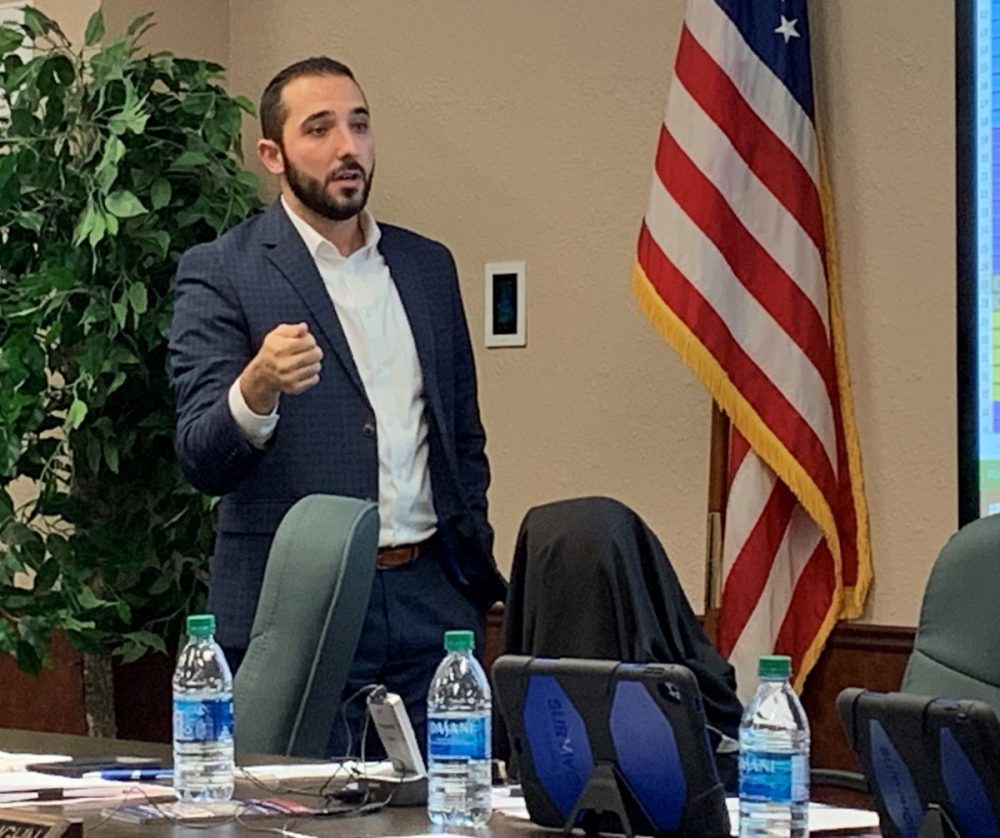
SSISD Trustees Asked To Consider Transportation Needs Of Band Program
The Sulphur Springs High School Jazz Band serenaded the school trustees this week with several numbers, which not only showed off the fun and growth of the program, but also showcased a few outstanding soloists as well.
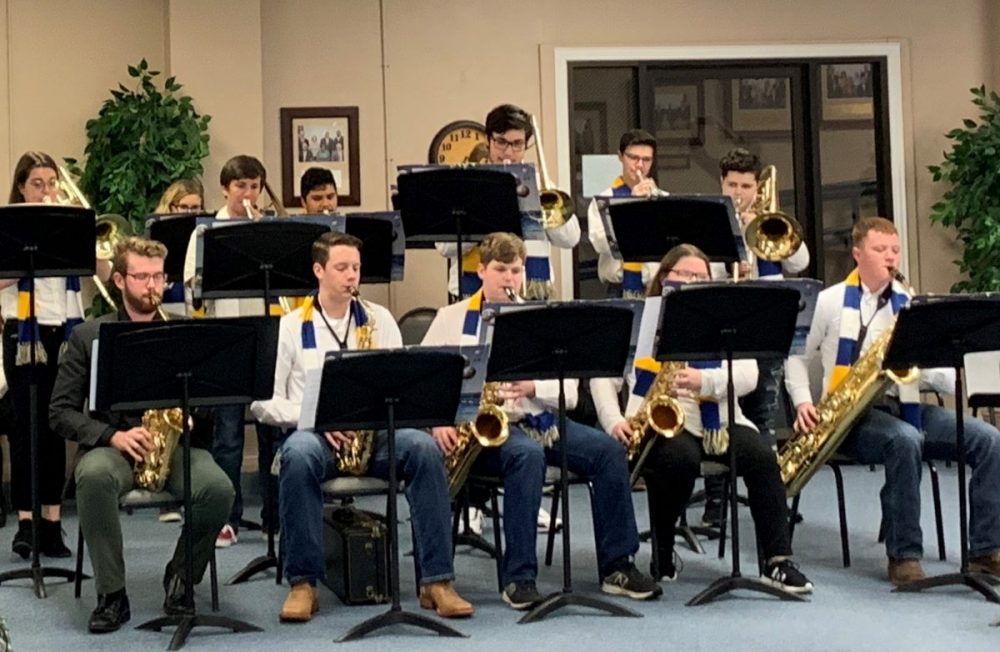
They’ve included some of the other SSISD fine arts students into their acts as well. Rose Oyad, who is advancing to State UIL Solo and Ensemble competition as both a soloist and part of an ensemble, lent her vocal talents to the act Monday night during the jazz band’s performance for SSISD board.
The students this year are attending in two jazz festivals, one at Tyler Junior College March 5-6 and another at the University of Texas-Arlington March 20-21.
Following the Jazz Band performance, SSISD Director of Bands Spencer Emmert asked the board to consider investing in new transportation to meet the growing needs of the SSHS band
“Basically, we are in desperate need for a bigger capacity transport for our band and our band equipment,” Emmert told the school board.
Emmert explained that marching band and competition has evolved of over the last several years, with a required prop schematic, elaborate front ensemble, percussion ensemble on the sidelines, growing color guard program, and full electronics amplification sound. And, Emmert pointed out the band program as a whole is grow.
“Looking down the road, we are hoping to move to what most of other groups are at right now. That’s having a semi to move our equipment. That sounds amazing, but that’s really what the status quo is nowadays,” the director of bands told the school board at their regular meeting Monday night.
Currently, the band program takes three vehicles to marching events: a box truck that SSISD purchased several years ago, band trailer that is about 25 years old and “barely on the road still,” and a rented U-Haul box truck.
“So, we were running three trucks the whole time. Our box truck, as it sits right now, is in and out of commission. I was on the side of the road for one time to the Frisco game, having to reset the transmission. So, there are some issues there with that,” Emmert said.
The new uniforms the district purchased in the last year are brought on a truck and issued to band members upon arrival at the performance destination. This helps keep them as fresh as possible and make them last longer. Uniform is one aspect they band is judged on at marching competition. The band needs a means to get the uniforms there in a timely manner in good condition.
“A lot of the time when we get to competitions, the parking crew does not know how to park us because they are used to a semi. They have all the semis parallel parked. It’s all nice and neat. We come in with three oddly shaped vehicles that have to have unloading directions,” Emmert said.



Several of the bands that also play at the games SSHS attends arrive with semis filled with their students’ equipment and needs. The semi can be custom equipped to open from multiple sides to allow more access for quicker unloading and set up as well. As it is, SSHS utilizes all of the student and volunteers possible to do so, but are limited in how many can be involved due to the limited space in the vehicles.
A customized two-floor semi would provide space for storage, secure the equipment and uniforms so they arrive in good condition and allow more people access for loading and unloading. Even color guard items can have “belly boxes” or drawers to store their equipment as well.
Emmert said while some Dallas-Fort Worth area districts can afford a rental contract for the busing service, most school districts buy their semi outright to get their band gear where it needs to go. In districts that have more than one high school, some have purchased a semi trailer for each.
Emmert said based on the low mileage for band travel, if SSISD decided not to invest the full amount of a brand new semi, another option to consider would be finding a semi with low mileage and purchasing it at auction.
A few staff or dedicated parents/band supporters would need the requisite license to drive a semi and trailer filled with band equipment. Emmert said he could attain his easily, as it doesn’t require much more than is needed to attain a license to operate a school bus.
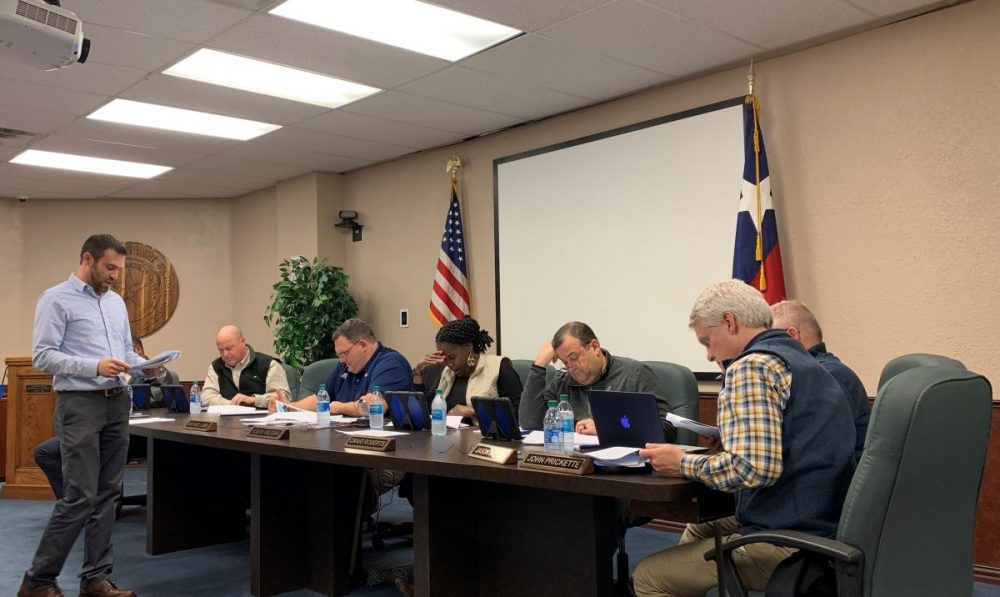
Emmert said his dad has the requisite license and has indicated a willingness to donate his time to drive a semi band trailer if one is acquired for the program. Staff could be made available too. A lot of other schools too utilize band parents and supporters who have the proper paperwork to drive a semi.
The band director said other programs could benefit from a semi as well, including theater programs.
SSISD Trustee John Prickette said he “can see the need” for a band trailer.
Lamb said while he’d asked Emmert to present the matter to the trustees this week for discussion only, he and Emmert hope to have a proposal for the board to actually consider for action in the next two months.
Being able to tell the students that a new trailer is on the way would be a huge morale booster for the students, who see the other districts arrive in these vehicles at events like the one they will be participating in next month.
See the Fine Arts Calendar on the SSISD website for additional information about upcoming performances and activities. Tune into KSST Radio 1230 AM, visit our website or check out Simply Sulphur Springs app for news on Sulphur Springs ISD band, fine arts and school reports.
Wood County Sheriff’s Report, January 29-February 4, 2020

Sheriff Castloo would like to remind everyone … if you have any information on these or any other crimes, please contact the Wood County Sheriff’s Office at 903-763-2201 or Crime Stoppers at 903-763-CASH.
Contact the Wood County Sheriff’s Office if you notice any suspicious vehicles or activity around your neighborhood. Please be aware of your surroundings.
January 29
- Deputies conducted a traffic stop on Highway 69 near the west Loop 564 in Mineola at approximately 12:09 a.m. Jazmynne Townsend, 24, of Cedar Hill, was arrested for Possession of a Controlled Substance and outstanding warrants.
- Deputies went out on an arrest/warrant service to the DPS Office in Quitman at approximately 8:27 a.m. Rocky Rodriguez, 31, of Lubbock, was arrested for an outstanding warrant.
- Deputies were dispatched to the intersection of County Road 3540 and FM 2869, at approximately 8:44 a.m., in reference to a welfare check. James Patterson, 42, of Hawkins, was arrested for Driving While Intoxicated.
- At 9:37 a.m., horses were reported out on County Road 4990 in Quitman.
- Deputies were contacted by telephone, at approximately 11:29 a.m., in reference to forgery. This case has been forwarded to investigators.
- Deputies were dispatched to 2922/2920, at approximately 11:30 a.m., in reference to a welfare check. Deputies located the individual and everything was ok.
- At approximately 12:00 p.m., deputies were dispatched to County Road 1612 in Alba in reference to a criminal mischief. Homes and cars in the neighborhood have been egged by actors, or actors unknown. Extra patrol has been requested.
- Deputies were dispatched to County Road 1860 in Yantis, at approximately 2:12 p.m., in reference to debit/credit card abuse. The complainant reported that her credit card has been used for unauthorized purchases. The report was made for documentation purposes.
- At approximately 2:41 p.m., deputies were dispatched to Stone Street in Mineola in reference to a suicidal subject. The individual was located and voluntarily went with EMS for evaluation.
- Deputies were dispatched to Greenbriar Trail in Hawkins, at approximately 5:22 p.m., in reference to an assault. Deputies met with the individuals involved and cleared the incident.
- At approximately 6:07 p.m., horses were reported out at 2088/14 near Cowboy Church.
- Deputies conducted a traffic stop on Highway 69 at Highway 37 in Mineola at approximately 9:27 p.m. Debbie Ballard, 50, of Quitman, was arrested for Man/Del Controlled Substance PG 1.
- Deputies were dispatched to County Road 2700/2749, at approximately 10:56 p.m., in reference to a suspicious person. Deputies searched the area, but were unable to locate the individual.
January 30
- At approximately 1:01 a.m., deputies were dispatched to Private Road 8692 in Winnsboro in reference to loud music. Deputies located the source of the noise and the individuals agreed to turn the music down.
- At approximately 4:02 a.m., deputies provided assistance to a motorist on 80 near 3832.
- Deputies were dispatched to Johnson and 80, at approximately 4:59 a.m., in reference to a suspicious vehicle. Deputies located the vehicle and cleared the incident.
- Deputies were dispatched to 80 and County Road 3836, at approximately 5:28 a.m., in reference to a traffic hazard. Deputies removed a deer from the roadway and cleared the incident.
- Deputies were dispatched to County Road 4575 in Winnsboro, at approximately 6:45 a.m., in reference to a man lying in a ditch. A male, 59, was found deceased in the ditch. An autopsy will be performed and the case remains active.
- Deputies were dispatched to Private Road 5474 in Quitman, at approximately 6:45 a.m., in reference to a disturbance. Bryan Couch, 28, of Quitman, was arrested for Assault Causes Bodily Injury Family Violence.
- At approximately 9:54 a.m., deputies were dispatched to Private Road 5554 in Alba in reference to a welfare check. Deputies located the individual and everything was ok.
- Deputies were dispatched to County Road 2906 in Mineola, at approximately 10:22 a.m., in reference to a criminal trespass. Deputies checked the building and everything was secure.
- At 12:00 p.m., cows were reported out on County Road 3120 in Quitman.
- Deputies were dispatched to Highway 80 in Mineola, at approximately 1:37 p.m., in reference to a welfare check. Deputies located the individual and everything was ok.
- Deputies were dispatched to County Road 2650, at approximately 2:07 p.m., in reference to an abandoned vehicle. Deputies located the vehicle, contacted the owner who picked it up and cleared the incident.
- At approximately 3:23 p.m., deputies were dispatched to W. FM 515, east of Highway 154 W. in reference to criminal trespass. Deputies checked the residence, did not locate anyone there and cleared the incident.
- Deputies were dispatched to Private Road 5860 in Yantis, at approximately 4:14 p.m., in reference to a disturbance. Deputies contacted EMS who transported a male in need of medical care to the hospital.
- Deputies were dispatched to County Road 4480 in Winnsboro, at approximately 5:37 p.m., in reference to an alarm. Deputies spoke with the homeowner who advised everything was ok.
- Deputies were dispatched to Highway 37 in Mineola, at approximately 5:45 p.m., in reference to an alarm. Deputies checked the area and secured the windows and doors.
- Deputies went out on an arrest/warrant service to Highway 37 at approximately 10:22 p.m. Deputies searched the area, but were unable to make contact with the individual.
January 31
- Deputies were dispatched to 17 and 1503, at approximately 12:14 p.m., in reference to a suspicious person. Deputies located the individual and cleared the incident.
- While on patrol, deputies noticed a suspicious vehicle, at approximately 12:31 a.m., on FM 17 in Alba. Deputies spoke with the individual in the vehicle and cleared the incident.
- Deputies conducted a traffic stop, at approximately 1:32 a.m., on County Road 1600 in Alba. Michael Carter, 55, of Garland, was arrested for Possession of a Controlled Substance.
- At approximately 8:09 a.m., deputies were dispatched to 14/3940 in reference to a traffic hazard. Deputies removed debris from the roadway and cleared the incident.
- At approximately 8:19 a.m., deputies provided assistance to a motorist on 3260.
- Deputies were dispatched to County Road 2302 in Mineola, at approximately 3:00 p.m., in reference to a criminal mischief. Clyde Threlkeld, 71, of Mineola, was arrested for Disorderly Conduct and Reckless Damage and Destruction.
- Deputies were dispatched to Private Road 6278 in Mineola, at approximately 3:07 p.m., in reference to a dog bite. The victim stated that she was bitten by a puppy that she was trying to help after 3 puppies were left on the side of the road. Deputies took possession of the puppies to quarantine them.
- At approximately 3:54 p.m., deputies provided assistance to a motorist on 182, behind the dam.
- Deputies were dispatched to County Road 2223 in Mineola, at approximately 3:58 p.m., in reference to forgery. The victim stated that actors, or actors unknown, had stolen checks from her, forged her name and cashed them. This case has been forwarded to investigators.
- Deputies were dispatched to Private Road 7855 in Hawkins, at approximately 4:50 p.m., in reference to a welfare check. Deputies were unable to locate the individual.
- At approximately 5:45 p.m., deputies were dispatched to 37, just north of 14, in reference to a traffic hazard. Deputies removed debris from the roadway and cleared the incident.
- Deputies were dispatched to N. Highway 69, at approximately 6:23 p.m., in reference to an alarm. Deputies checked the area and secured the building.
- Deputies were dispatched to County Road 4555, at approximately 9:59 p.m., on a welfare check. Deputies located the individual and everything was ok.
- At approximately 11:44 p.m., horses were reported out on County Road 269.
February 1
- Deputies were dispatched to County Road 2265, at approximately 1:33 a.m., in reference to a suspicious vehicle. Deputies located the vehicle and cleared the incident.
- At approximately 1:47 a.m., deputies provided assistance to a motorist on 1799/2298.
- Deputies were dispatched to County Road 2330 in Mineola, at approximately 7:19 a.m., on a welfare check. Deputies were unable to locate the individual.
- At approximately 7:39 a.m., deputies assisted DPS with a minor accident on 69 N. Autumn Ripley-Tillinghast, 19, of Mineola, was arrested for an outstanding warrant.
- Deputies conducted a traffic stop on 515/1886 at approximately 9:43 a.m. Billy Lowry, 64, of Bullard, was arrested on outstanding warrants.
- Deputies were dispatched to 37/4134, at approximately 12:35 p.m., on a welfare check. Deputies located the individual and everything was ok.
- Deputies went out on an arrest/warrant service to Spur 514 in Yantis at approximately 1:23 p.m. Deputies searched the area, but were unable to make contact.
- At approximately 1:50 p.m., deputies were dispatched to Private Road 6301 in reference to a 9-1-1 hang up call. Deputies located the individual and everything was ok.
- Deputies conducted a traffic stop on Highway 80 at approximately 2:59 p.m. Christine Mbugua, 51, of Venus, was arrested for an outstanding warrant.
- At approximately 4:44 p.m., cows were reported out on County Road 3120.
- Deputies were dispatched to Golf Drive in Holly Lake Ranch, at approximately 6:48 p.m., in reference to an assault. Deputies met with both individuals involved and cleared the incident.
- Deputies were dispatched to FM 2966, at approximately 9:09 p.m., in reference to a suspicious person. Deputies searched the area, but were unable to locate the individual.
- Deputies were dispatched to County Road 2167, at approximately 9:22 p.m., in reference to a fire. Deputies determined this to be a controlled brush fire.
- At approximately 11:07 p.m., deputies were dispatched to FM 1801 in Mineola in reference to loud music. Deputies located the source of the loud music and the homeowners agreed to turn it down.
- At approximately 11:15 p.m., deputies were dispatched to County Road 2504 in reference to loud music. Deputies located the source of the music and the homeowners agreed to turn it down.
February 2
- Deputies conducted a traffic stop on State Highway 14 in Hawkins at approximately 12:16 a.m. Mary King, 36, of Lindale, was arrested for Driving While Intoxicated.
- At approximately 12:22 a.m., deputies were dispatched to County Road 2501 in reference to loud music and fireworks. Deputies located the source of the music and fireworks and the homeowners agreed to shut everything down for the night.
- Deputies were dispatched to 2966, east of 1822, at approximately 8:16 a.m., in reference to a welfare check. The individual was located and everything was ok.
- At approximately 10:38 a.m., cows were reported out on 3986/312.
- Deputies were dispatched to County Road 2128, at approximately 11:47 a.m., in reference to reckless driving. Deputies located the vehicles and cleared the incident.
- At approximately 2:37 p.m., deputies provided assistance to a motorist near U.T. Health Quitman.
- Deputies were dispatched to FM 49, at approximately 2:36 p.m., in reference to an alarm. Deputies secured the building.
- At approximately 3:05 p.m., deputies provided assistance to a motorist on 4200/4215.
- Deputies were dispatched to County Road 2174, at approximately 7:37 p.m., in reference to suspicious circumstances. Deputies responded and located a controlled brush burn.
- Deputies were dispatched to County Road 1858, at approximately 8:21 p.m., in reference to criminal mischief. Actors, or actors unknown, spray painted the victim’s vehicle. This case has been forwarded to investigators.
- Deputies were dispatched to E. Highway 80, at approximately 9:52 p.m., in reference to a disturbance. Deputies spoke with the individuals involved, had them separate and cleared the incident.
February 3
- Deputies were dispatched to FM 288 in Quitman, at approximately 6:47 a.m., in reference to an alarm. Deputies secured the residence.
- Deputies were dispatched to County Road 4250 in Winnsboro, at approximately 7:47 a.m., in reference to a welfare check. Deputies located the individual and everything was ok.
- At approximately 9:00 a.m., cows were reported out on FM 2088.
- Deputies were dispatched to FM 1799 in Mineola, at approximately 12:52 p.m., in reference to a theft. The victim reported that actors, or actors unknown, stole his tractor. This case has been forwarded to investigators.
- Deputies were dispatched to N. FM 14 in Quitman, at approximately 2:06 p.m., in reference to a welfare check. Deputies located the individual and everything was ok.
- Deputies were dispatched to County Road 2317 in Mineola, at approximately 2:14 p.m., in reference to an inquest. A male, 75, was found deceased in his residence. The Justice of the Peace was notified and no autopsy was ordered.
- At approximately 6:12 p.m., horses were reported out on County Road 4890 in Winnsboro.
- Deputies were dispatched to FM 2869 in Hawkins, at approximately 6:12 p.m., in reference to an alarm. Deputies searched the area and secured the residence.
- Deputies went out on an arrest/warrant service to N. 37, at approximately 7:44 p.m. Joseph Jones, 43, of Quitman, was arrested for outstanding warrants.
- Deputies went out on an arrest/warrant service to FM 1799 in Golden, at approximately 11:37 p.m. Jennifer Newman, 37, of Golden, was arrested for outstanding warrants.
February 4
- Deputies went out on an arrest/warrant service to County Road 2298 in Golden, at approximately 12:37 a.m. Deputies searched the area, but were not able to make contact.
- Deputies were dispatched to a boat ramp at Lake Holbrook, at approximately 12:48 a.m., in reference to a suspicious vehicle. Deputies located the vehicle and cleared the incident.
- Deputies were dispatched to County Road 2954 in Alba, at approximately 1:31 a.m., in reference to an inquest. A male, 66, was found deceased in his residence. The Justice of the Peace was notified and no autopsy was ordered.
- Deputies went out on an arrest/warrant service to Main Street in Quitman, at approximately 8:31 a.m. Tyler Wright, 27, of Quitman, was arrested for an outstanding warrant.
- Deputies went out on an arrest/warrant service to County Road 1600 at approximately 10:17 a.m. Deputies searched the area, but were unable to make contact.
- At approximately 11:51 a.m., deputies provided assistance to a motorist on 154.
- Deputies were dispatched to County road 1850 in Yantis, at approximately 12:11 p.m., in reference to a welfare check. Deputies located the individual and everything was ok.
- Deputies were dispatched to the WCSO lobby, at approximately 12:21 p.m., in reference to forgery. The victim reported that actors, or actors unknown, had transferred funds out of her bank account without her permission. This case has been forwarded to investigators.
- Deputies were dispatched to County Road 2445 in Mineola, at approximately 12:28 p.m., in reference to a welfare check. Deputies were unable to locate the individual.
- Deputies were dispatched to the WCSO lobby, at approximately 12:46 p.m., in reference to Criminal Mischief. The victim reported that actors, or actors unknown, had cut the brake line on his vehicle. This case has been forwarded to investigators.
- Deputies were dispatched to Pinewood Court in Holly Lake Ranch, at approximately 2:01 p.m., in reference to a disturbance. Lance Jones, 50, of Mount Vernon, was arrested for Criminal Mischief and Unlawful Carrying of a Weapon.
- At 4:21 p.m., cows were reported out on 154E near County Road 3120.
- Deputies were dispatched to FM 3056 in Hawkins, at approximately 7:19 p.m., in reference to harassment. Deputies spoke with the victim and the suspect who advised that the harassment would stop.
- Deputies conducted a traffic stop on Highway 154 @ County Road 1880 in Yantis at approximately 8:56 p.m. Curtis Windham, 53, of Emory, was arrested for Driving While Intoxicated.
- Deputies were dispatched to County Road 2175 in Quitman, at approximately 11:30 p.m., in reference to a theft. The victim reported that actors, or actors unknown, had stolen items from his toolbox located in the bed of his truck. This case has been forwarded to investigators.
Between the dates of January 29th and February 4th, Wood County Sheriff’s Deputies responded to multiple agency assists that included the following:
- Quitman Police Department
- Quitman Volunteer Fire Department
- Department of Public Safety
- Mineola Police Department
- U.T. Quitman
- EMS
- Hawkins Police Department










